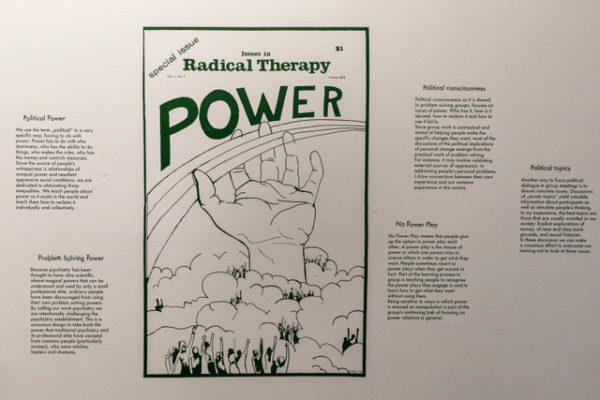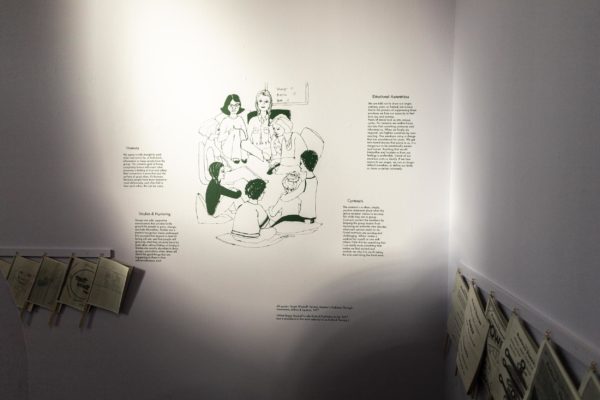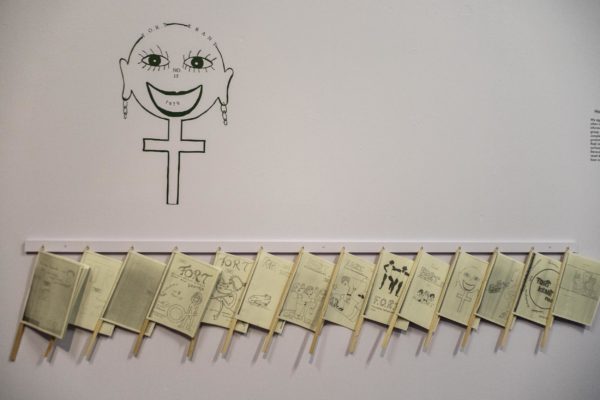Feminist Radical Therapy and Alliances Between Women

Inga Zimprich (Feminist Health Care Research Group)- A Special Issue in Power. Foto: Chiara Faggionato.

Inga Zimprich (Feminist Health Care Research Group)- A Special Issue in Power. Foto: Chiara Faggionato.

Inga Zimprich (Feminist Health Care Research Group)- A Special Issue in Power. Foto: Chiara Faggionato.
A Conversation with Gail Pheterson
Hybrid online/offline event (in English)
13 November 2021, 11 am – 1 pm
11 am Introduction and presentation of the work A Special Issue in Power as part of On Illness, Resistance and Modes of Collective (Health) Care at District Berlin with (Inga Zimprich)
11.30 am – 1 pm A Conversation with Gail Pheterson: Feminist Radical Therapy and Alliances Between Women, followed by Q&A
LANGUAGE: The event takes place in English.
We aim to offer simultaneous translation to German.
REGISTRATION: Due to Covid regulations the number of participants on location is limited. To join online or offline, please register by emailing sending an email to office@district-berlin.com and state whether you plan to attend in person at District or whether you’ll join via Zoom.
COVID: To make the gatherings at District as safe as possible amidst the ongoing Corona virus pandemic, we kindly ask everyone to join with a proof of completed vaccination, recovery or a negative Covid test (3G). You can also do a quick test on site. Please wear FFP2 masks indoors.
ACCESSIBILITY:
District is working on becoming more accessible. A wheelchair-accessible ramp and a Dixi toilet are installed for the current events. An assistant will be on site if required and booked in advance. For the way here and back, it is possible to book a free BVG accompanying service here. The nearest public transport stop is Eresburgstraße (450 m to District at Malzfabrik, bus 106 to/from Südkreuz). There is no childcare available and no DGS translation provided. The attendance of the exhibition and program is free of charge. Please attend this event low scent or scent-free.
For further information and requests, please contact District at: ak@district-berlin.com
As a previously active Radical Therapy practitioner I, Inga Zimprich, use the artistic research project A Special Issue in Power – an engagement with Radical Therapy to question whether Radical Therapy allows us to work on intersecting discriminations, such as racism, classism, hetero-/cis-sexism and ableism, in self-organized therapeutic frameworks that make all its potential practitioners feel equally safe and welcome.
One of the most inspiring projects I learned about through this working process is Gail Pheterson’s Feminist Alliance Project developed in the 1980s. Not only did Gail Pheterson – together with her colleague Lillian Moed – initiate the F.O.R.T. (Feministische Oefengroepen Radikale Therapie)-movement in the Netherlands. With the Feminist Alliance Project Gail subsequently initiated parallel RT groups, that worked against internalized oppression and internalized domination in groups made up of women from different social positions. The Feminist Alliance Project aimed “to address the racism, anti-Semitism, and heterosexism that divide women” (Gail Pheterson: Alliances between Women: Overcoming Internalized Oppression and Internalized Domination. Published in Signs, Vol. 12, No. 1, autumn, 1986).
A Special Issue in Power
– an engagement with Radical Therapy
Inga Zimprich (Feminist Health Care Research Group)
In the late 1960s Radical Therapy (RT) developed in the US as a movement of therapists and activists who aimed to democratize and de-professionalize their therapeutic tools to offer them as means for social empowerment and political change. They established the newspaper The Radical Therapist as a means of communication within the Radical Therapy movement. In reaction to the sexism at play in the Radical Therapist scene, marxist feminist Hogie Wyckhoff developed Problem Solving Groups for Women, in which Radical Therapy provided the framework to practice mutual support.
In 1975 Gail Pheterson and Lillian Moed facilitated three week-long workshops for groups of Dutch feminists in the Netherlands. Pheterson and Moed combined two different methods in these trainings: Radical Therapy and Re-evaluation Counseling. From these workshops Feministische Oefengroepen Radikale Therapie (F.O.R.T.) sprang forth and initiated a large movement of feminist Radical Therapy groups that numerous persons in the Netherlands engaged in.
Inga Zimprich (she/her) is a white, able-bodied cis-woman. Inga is an artist, deaf-blind assistant and mother. She initiated Feminist Health Care Research Group and is part of Sickness Affinity Group.
A Special Issue in Power – an engagement with Radical Therapy is part of On Illness, Resistance and Modes of Collective (Health) Care at District Berlin. It has been financially supported by the Berlin Senate’s research grant.
